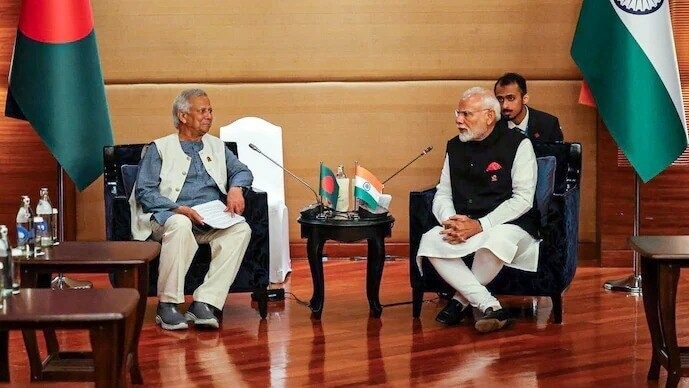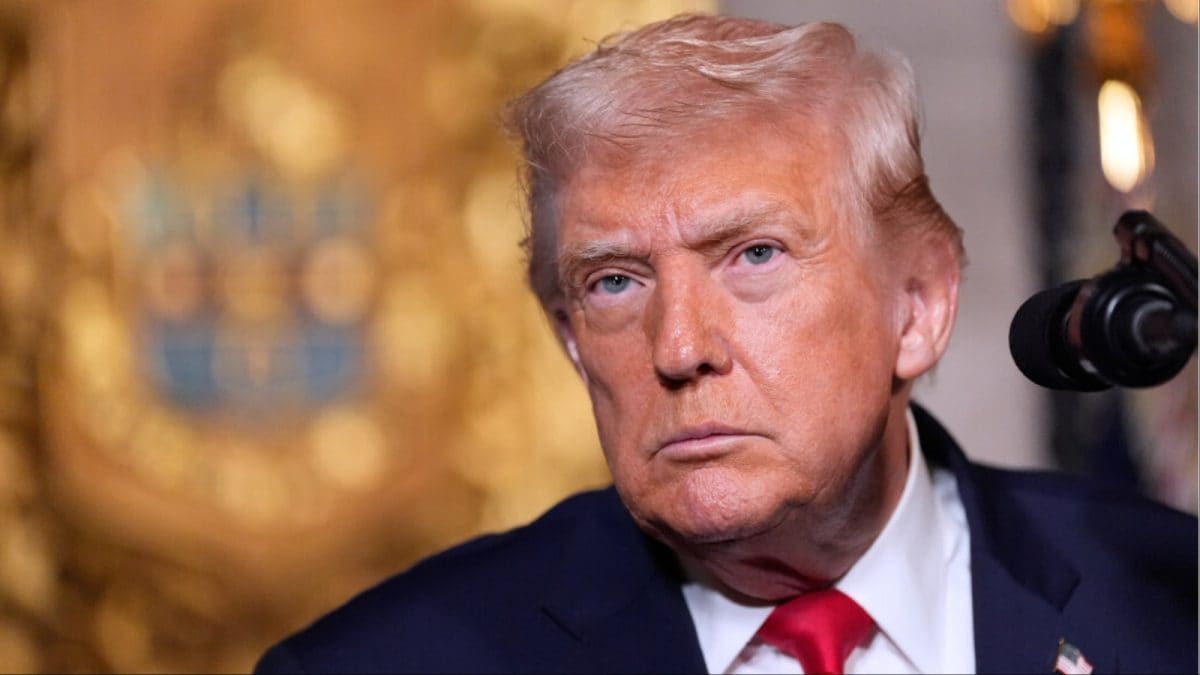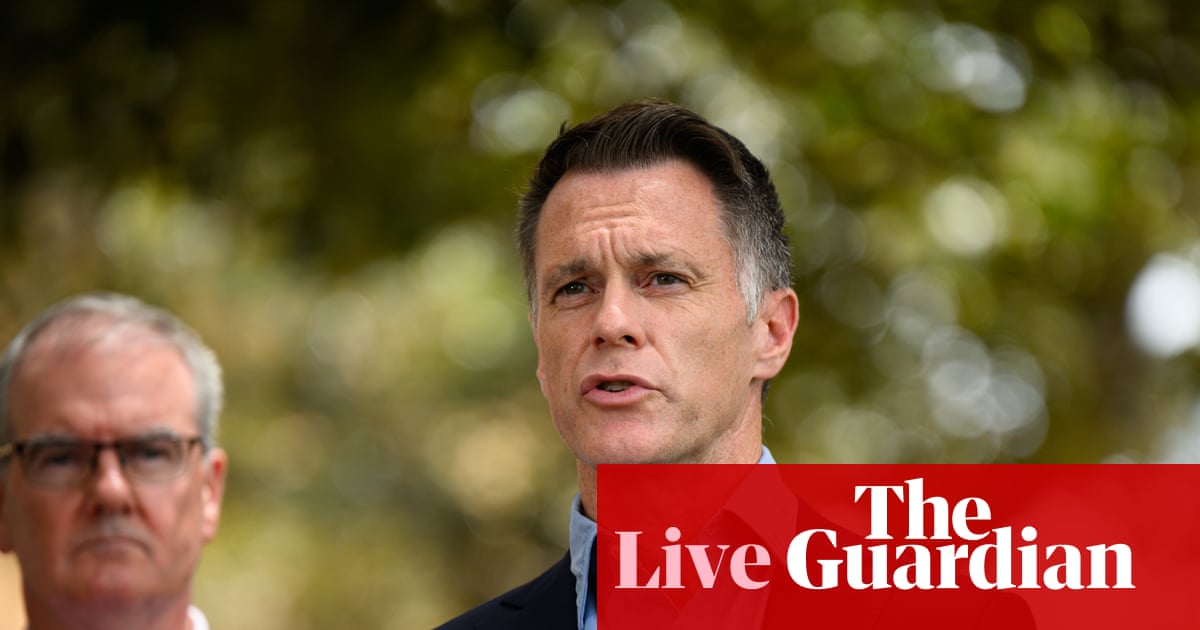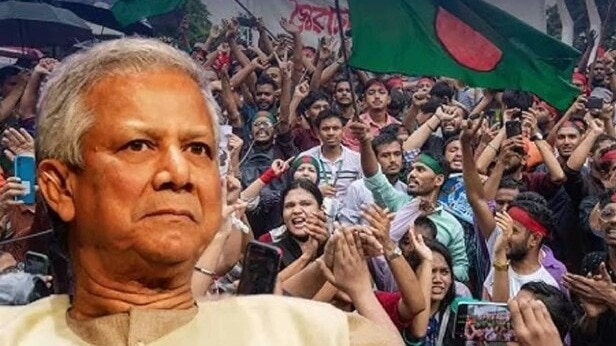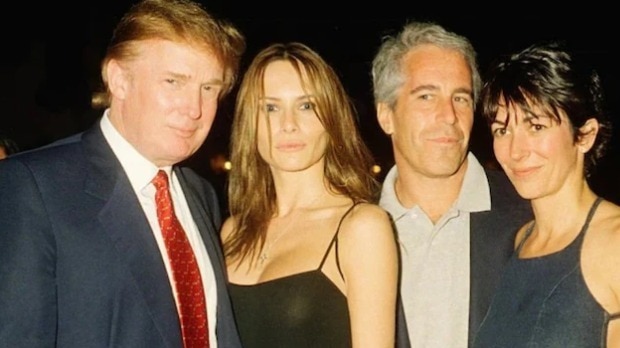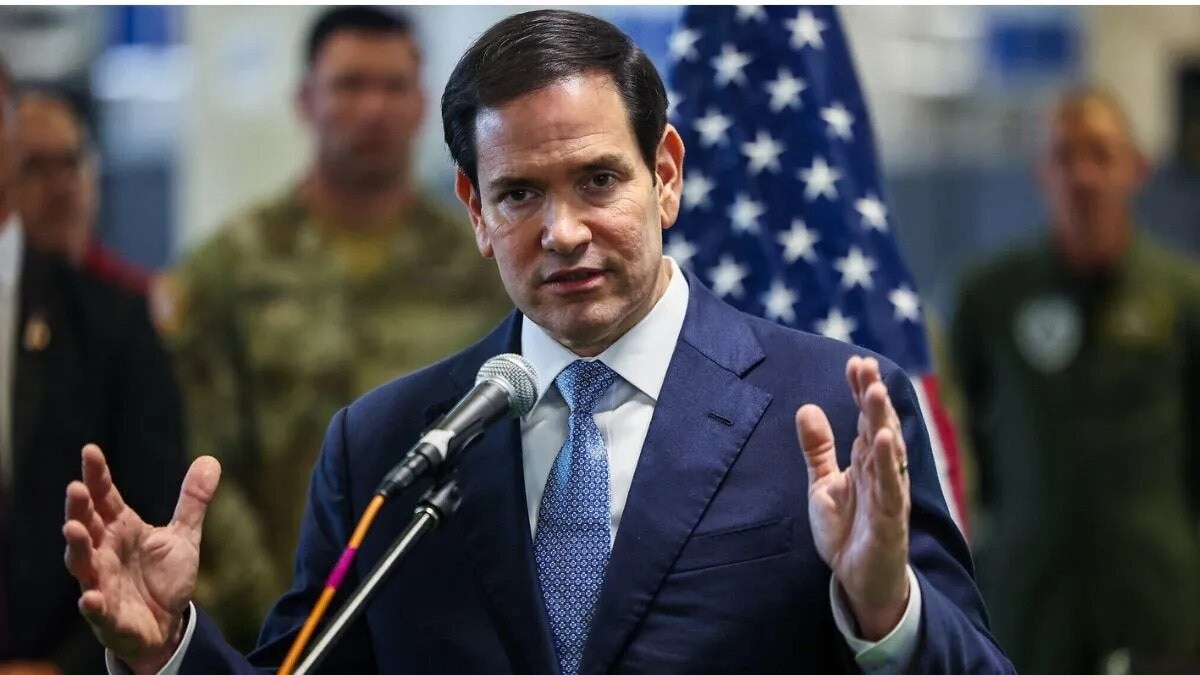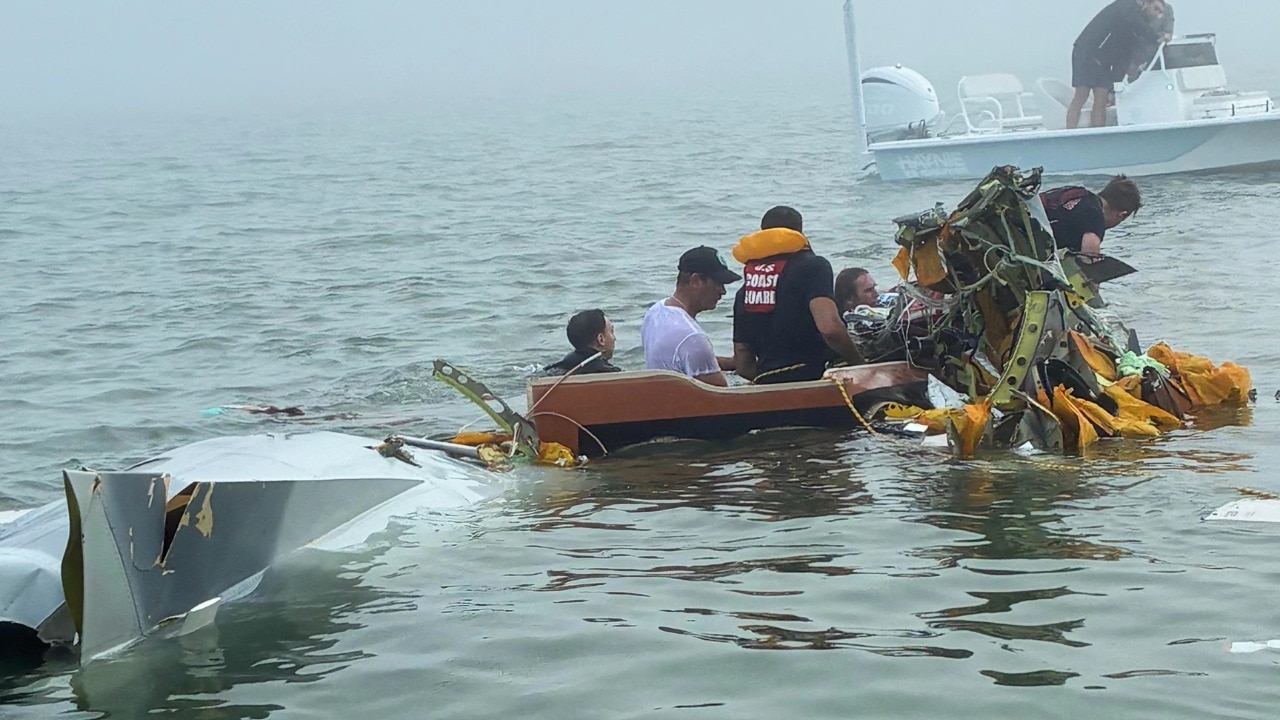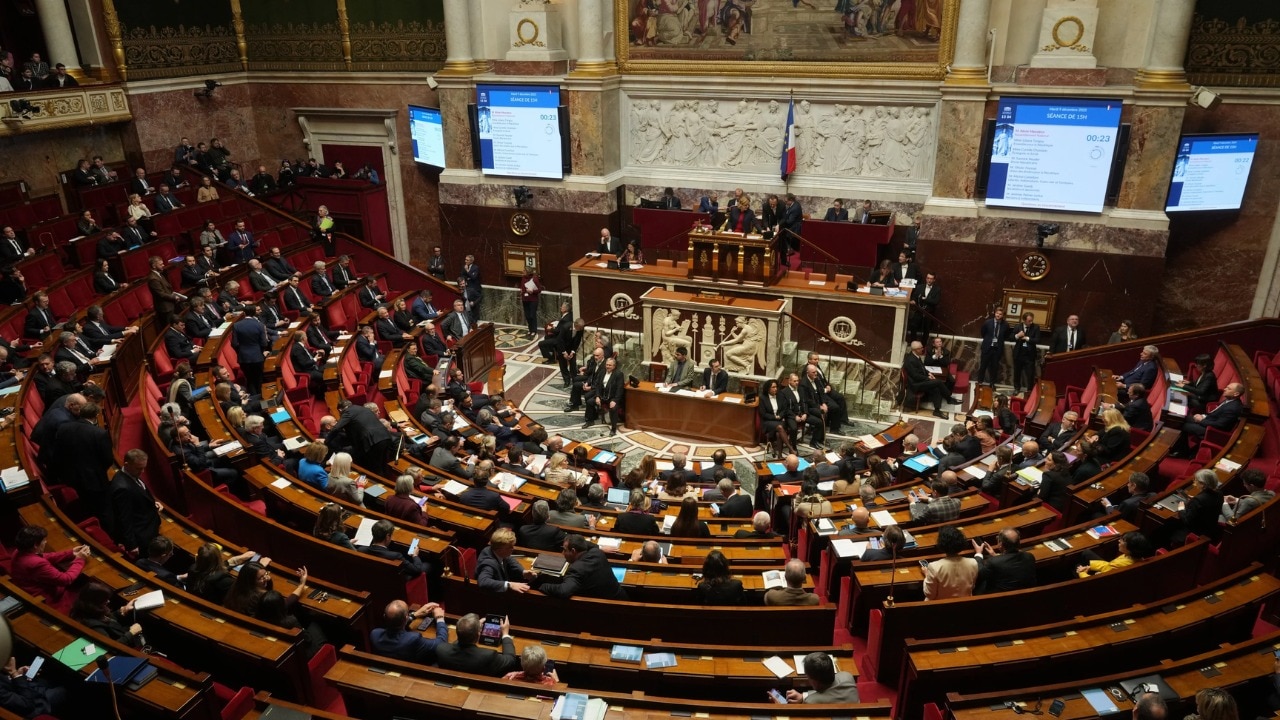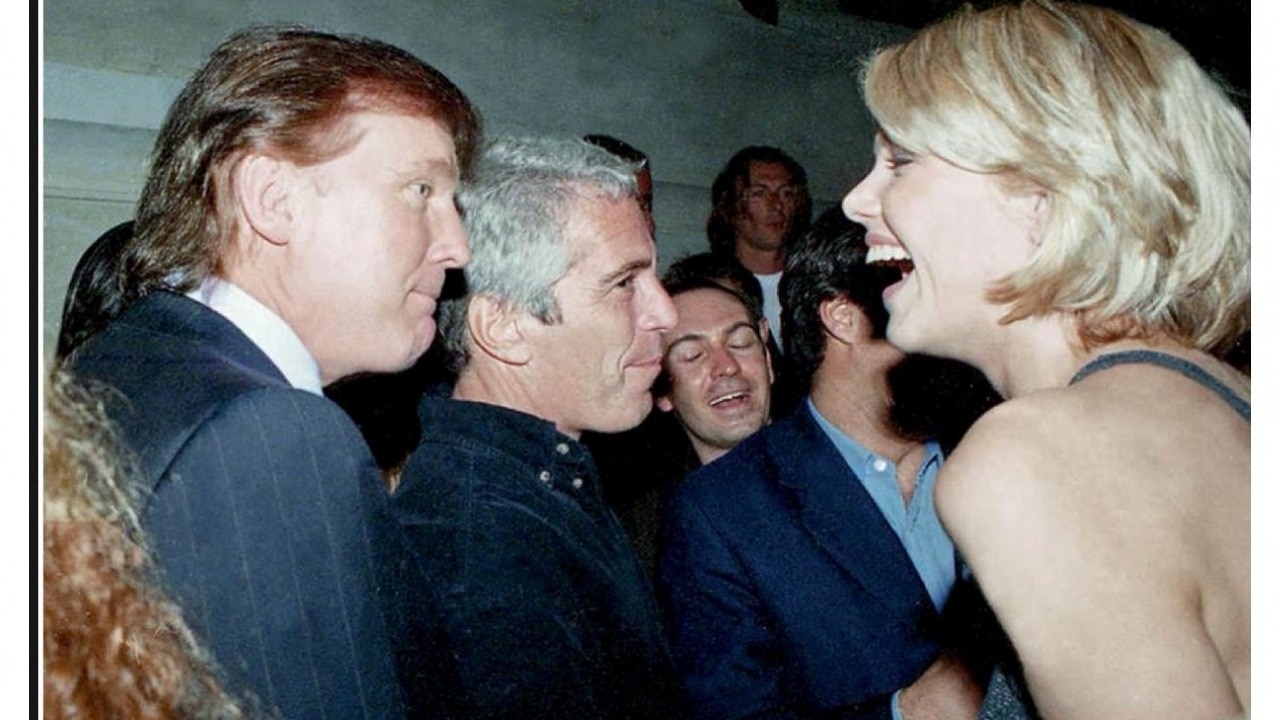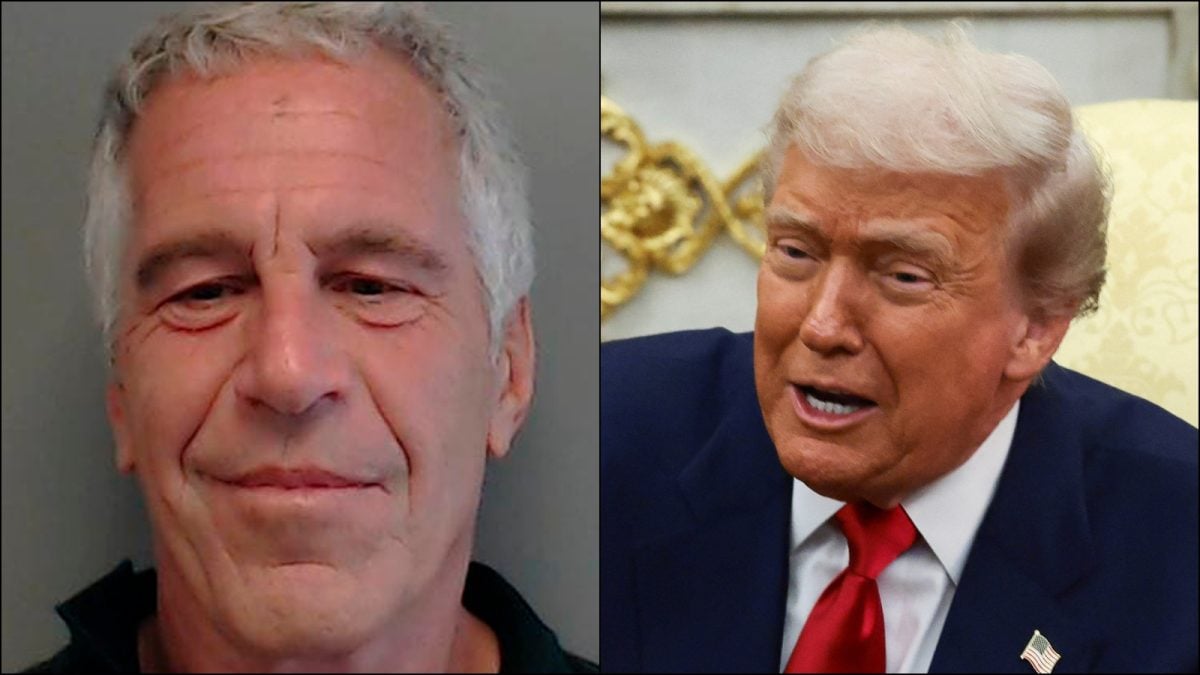Albanese dines with Trump in South Korea
More now on Anthony Albanese and Donald Trump’s dinner on the Apec sidelines in Gyeongju last night.
The US president told reporters that the pair “had a great meeting a week ago”, the ABC reports, referring to their Washington meeting.
Trump continued:
You’ve done a fantastic job and we’re working together on rare earths, but we’re working on a lot of things together, and it’s all working out very well.
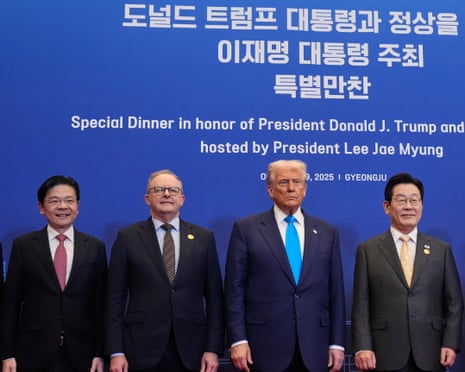
The main event of the summit was Trump negotiating a trade deal with South Korea, but it was also a chance for Albanese to continue the diplomatic whirlwind of recent weeks that has seen him travel to the US (twice), UK, UAE, Malaysia and now South Korea.
I’m working with leaders from across the globe to get things done for Australia.
Here at APEC we have a seat at the table – and we use it to back Australian jobs, Australian businesses and to create new opportunities for our exporters and investors.
Because what happens in the… pic.twitter.com/a6mSReiPoE
Writing on X, Albanese said:
I’m working with leaders from across the globe to get things done for Australia.
Here at APEC we have a seat at the table – and we use it to back Australian jobs, Australian businesses and to create new opportunities for our exporters and investors.
Because what happens in the world matters to Australia. Thank you for the warm welcome to South Korea, President Lee Jae Myung.
Key events Show key events only Please turn on JavaScript to use this feature
Australians should be ‘alarmed’ if Labor negotiates with Greens on environment bill
I told you it would be environment-heavy didn’t I!
The shadow environment minister, Angie Bell, joined Sky News a moment ago and said the government should negotiate with the Coalition on the EPBC Act, but then said her party is a “long way” from reaching a deal with Labor.
Remember, Murray Watt said he would like a deal closed and the legislation passed through parliament by the end of the year (and there are just over two sitting weeks left in the year). Though it won’t be easy either way: the Greens also want to secure some major concessions from the government.
Bell says:
I think Australians should be alarmed at the thought that Labor would go to the Greens and do a deal on this, because our country would be much worse off. Let’s look at the wealth of our nation and where that wealth has come from. Let’s look at where the money goes from mining into the coffers of state governments, and how they then deliver on hospitals and schools around their nation and infrastructure … We are a long way from doing a deal with Labor on this.
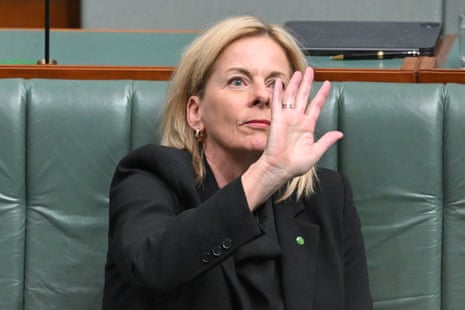

Krishani Dhanji
Good morning, Krishani Dhanji here with you, thanks to Martin Farrer for getting us started.
It’s going to be a heavily environment-focused day – we’ll see minister Murray Watt at the Press Club and he’ll be introducing the environment protection and biodiversity conservation (EPBC) bill in parliament today.
There’s also plenty of reaction around to the PM’s dinner with Apec leaders (including one Donald Trump) in South Korea overnight, as well as the inflation data released yesterday.
Stick with us!

Andrew Messenger
Downgrade of Queensland’s credit rating ‘inevitable’, treasurer says
Queensland’s treasurer, David Janetzki, has told parliament a downgrade of the state’s credit rating is “inevitable” due to poor budgetary performance.
Earlier this month, ratings agency S&P Global affirmed a negative outlook for Queensland’s state government, forecasting the state will owe a debt to revenue ratio of 150% by 2028, up from 100% in 2023, due to a historically large infrastructure investment partly as a result of the 2032 Olympics and Paralympic Games.
Janetzki blamed his predecessor, Cameron Dick, for a $5.38bn deficit, but said the budget had since improved and the state would now run a deficit of just $4.43bn.
Those opposite [the Labor opposition] squandered revenue rivers of gold with community safety, health and housing outcomes going backwards on their watch.
Mr Speaker, Labor’s fiscal vandalism has made a credit rating downgrade highly likely, even inevitable. Their debt, deficit and deception legacy will take time to fix this term and the next.
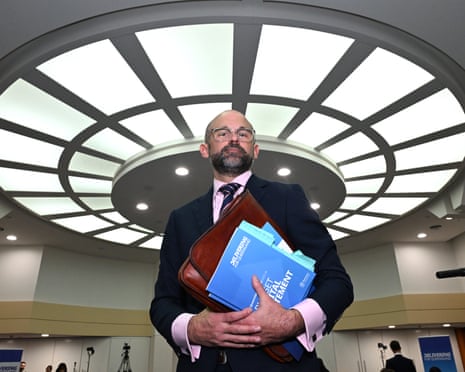

Anne Davies
Followed on from last post…
The NSW investment announcement follows some serious setbacks for major renewables projects in NSW in the last 12 months.
Equinor, the Norwegian state-owned conglomerate behind the proposed $10bn Novocastrian windfarm near Newcastle, announced in May it would withdraw from the project and in August formally pulled out leaving the project in doubt.
Plans to build a nearly 500 megawatt windfarm at Barneys Reef in central-western New South Wales have been also abandoned, with the project’s developer, RES, claiming that “changing economic and planning requirements” in the state have made it too challenging to proceed.
There has also been community revolts over windfarms in the south-west renewable energy zone around Goulburn, prompting the local Liberal member, Wendy Tuckerman, to resign from the opposition frontbench over what she said was a lack of consultation within her own party over renewables legislation.
Whether the IDA can reignite any of the failed renewables projects or translate interest into investment remains to be seen.
Minns said:
Forty-eight proposals worth $136bn shows exactly why we created the Investment Delivery Authority. This level of interest is really promising. It shows the IDA is something investors have been waiting for.
Our government is sending a clear message to global investors: if you bring your money to NSW, we’ll help you navigate our system.
NSW premier to trumpet success of investment authority

Anne Davies
The Minns Labor government is trumpeting its new Investment Delivery Authority as a success story in getting more investment to NSW, announcing it has has received 48 major proposals worth $136bn in the first round of expressions of interest.
The scheme, which is modelled on its Housing Delivery Authority, aims to provide a single point of entry for investors, and help navigating approvals, so projects can get started more quickly.
In the first round 22 projects relate to renewable energy and energy security – valued at $63bn, while 23 projects relate to data centres and technology – valued at $72bn.
To be eligible for the fast-track most projects must be valued at more than $1bn. However, the IDA is also helping with hotel projects over $200m. Three further applications – valued at $860m – were received.
The level of interest will be spruiked by the premier Chris Minns at the Sydney Investment Summit at the Opera House this morning.
No more big economic reforms this year, says Chalmers

Patrick Commins
Jim Chalmers says any further economic reforms will be delayed until the May budget, after he ruled out any new government policies in December’s mid-year fiscal update.
The treasurer told assembled business figures at the Australian Chamber of Commerce and Industry’s gala dinner in parliament house last night that “this year’s Myefo will not be a mini-budget with lots of new initiatives”.
The mid-year update will be precisely that – an opportunity to update forecasts and the fiscal position. The main game will be May.
Chalmers is coming off a bruising backdown on key aspects of his $3m super policy, which will, if and when it is legislated, raise taxes on the top 0.5% of savers.'
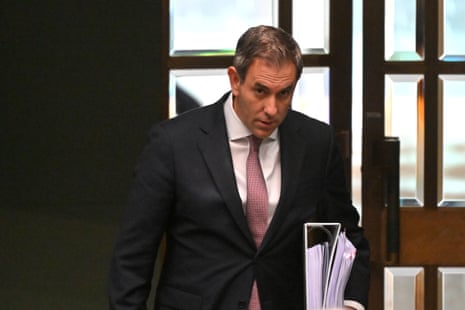
Sitting idle is definitely not part of Chalmers’ modus operandi, however, and he was keen to point out the many small steps in the right direction being taken since August’s economic reform roundtable.
The commonwealth has “just signed off on the first set of state and territory reforms” that will be rewarded with incentive money from the government’s $900m productivity fund.
They include the Northern Territory government promising “stop unnecessary objections to commercial developments” and the ACT looking at ways to remove barriers to prefabricated materials for use in home-building.
“There’s been so much progress already on the directions set by the roundtable, and we’ll bring even more of it together in our fifth budget,” Chalmers said.
The RBA was always looking for an excuse not to cut, writes Greg Jericho

Martin Farrer
It’s fair to say the Albanese government needs some good news on prices – especially energy prices – after yesterday’s inflation figures appeared to put paid to any prospect of a rate cut by the RBA next week.
Our economics columnist, Greg Jericho, has been looking at the numbers and agrees with the consensus among forecasters that there’ll be no rate cut.
However, he does find some reason for optimism on prices because the headline figure has been strongly affected by the end of household energy bill subsidies, and also because underlying increases in the cost of goods and services are not terrifyingly high.
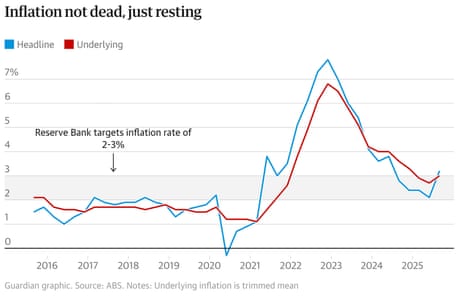
Read his full piece here:
Bowen predicts lower electricity prices as wholesale costs fall

Luca Ittimani
Chris Bowen has predicted lower electricity prices for consumers after wholesale electricity prices from July to September fell nearly 40% from the previous quarter.
Rising renewable energy output slashed costs and sent records tumbling, according to data released today from the Australian Energy Market Operator (Aemo). Responding to the report, Bowen said:
The drop in wholesale price is good news – and should flow through to retail energy prices in the near term.
Queensland had the lowest average spot price at $72/MWh after prices fell to zero or lower more than a quarter of the time, which was a state record, Aemo’s quarterly energy dynamics report read.
Record high wind power output, along with rising rooftop and grid-scale solar and a dip in coal-fired power output, saw renewables contribute 42.7% of the fuel mix, which was a September quarter record.
Renewables made up 77.2% of total energy generation across the national market for half an hour on 22 September, an all-time high, according to Aemo.
Underlying energy demand also hit a September quarter record, thanks to heating in the cold winter months, rising data centre consumption and increasing replacement of home appliances and vehicles with electric alternatives.
Albanese dines with Trump in South Korea
More now on Anthony Albanese and Donald Trump’s dinner on the Apec sidelines in Gyeongju last night.
The US president told reporters that the pair “had a great meeting a week ago”, the ABC reports, referring to their Washington meeting.
Trump continued:
You’ve done a fantastic job and we’re working together on rare earths, but we’re working on a lot of things together, and it’s all working out very well.

The main event of the summit was Trump negotiating a trade deal with South Korea, but it was also a chance for Albanese to continue the diplomatic whirlwind of recent weeks that has seen him travel to the US (twice), UK, UAE, Malaysia and now South Korea.
I’m working with leaders from across the globe to get things done for Australia.
Here at APEC we have a seat at the table – and we use it to back Australian jobs, Australian businesses and to create new opportunities for our exporters and investors.
Because what happens in the… pic.twitter.com/a6mSReiPoE
Writing on X, Albanese said:
I’m working with leaders from across the globe to get things done for Australia.
Here at APEC we have a seat at the table – and we use it to back Australian jobs, Australian businesses and to create new opportunities for our exporters and investors.
Because what happens in the world matters to Australia. Thank you for the warm welcome to South Korea, President Lee Jae Myung.
Welcome

Martin Farrer
Good morning and welcome to our live news blog. I’m Martin Farrer with the top overnight stories and then it will be Krishani Dhanji with the main action.
After waiting what seemed like a long time to meet Donald Trump, Anthony Albanese has done so twice in the space of 10 days as he followed up his trip to Washington last week by sitting next to the US president at the Asia-Pacific Economic Cooperation (Apec) summit dinner in Gyeongju, South Korea, last night.
Yesterday’s inflation figures came as a blow to the federal government’s efforts to rebalance the economy but today the energy minister, Chris Bowen, is trying to tell a more upbeat story as he promises that households will see lower electricity prices in the “near term”. It follows a steep fall in wholesale electricity prices in the quarter to September, helped by more renewable power coming into the system.
More soon.

 1 month ago
1 month ago



